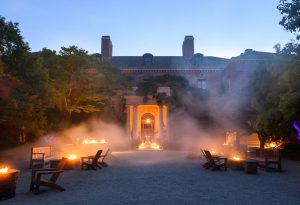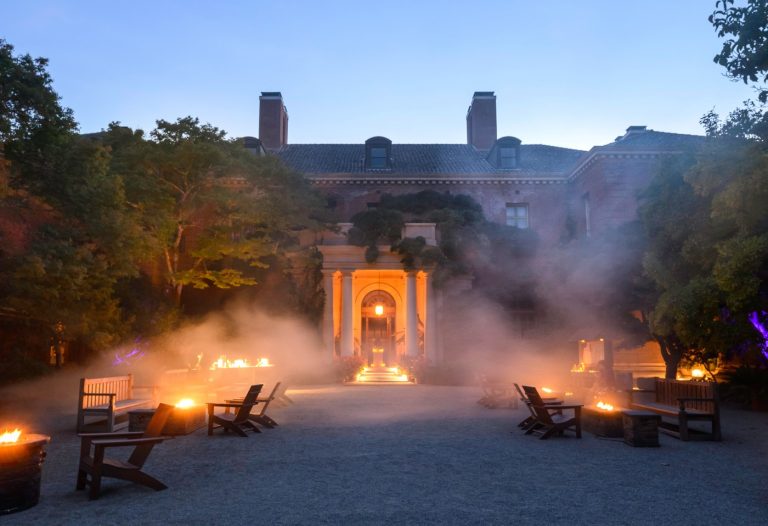CHICO — Wet weather didn’t dissuade a capacity crowd from attending the Chico City Council meeting Tuesday evening, with a range of items grabbing attention.
A contingent of two-dozen Public Works employees and family members came to observe the proceedings and stayed into discussions on downtown. Another sizeable group, a dozen mobile home park residents, came with signs advocating for relief from rent increases — among the later action items on the agenda.
Significantly, the council gave final approval to a cardroom’s relocation to downtown from north Chico but opted to put off deciding on the removal of a city provision capping liquor licenses in the downtown core. Councilors also called for a revised version of Measure H to go before voters to hedge against a state initiative that could jeopardize the sales tax as approved and delay pursuing a pro-housing designation.
A pie chart indicates allocations to date of Measure H revenues, part of a discussion on the sales tax at the City Council meeting Tuesday, Jan. 16, 2024, in Chico, California. (Evan Tuchinsky/Enterprise-Record)
In a series of meetings last year, Casino Chico received land-use and design approvals for a seven-table cardroom serving food and beverages, including alcohol, at 325 Broadway. The final action Tuesday involved a revenue-sharing proposition from owner Jon Scott, which the Planning Commission had unanimously approved.
Scott offered the city 5% of gross earnings from participation fees (the money a cardroom collects for facilitating play between patrons) as a contribution similar to the community benefit payment from cannabis dispensaries. In response to councilor questions, city planner Kelly Murphy explained the contribution would go to the general fund, and Scott said he wouldn’t pass along the 5% to his customers.
Scott further explained that since opening at the current location, inside Quackers on East Avenue, police have never had to respond to issues with his clientele. Police Chief Billy Aldridge confirmed that characterization.
“We don’t want to just be a good neighbor,” he said, “we want to be a great neighbor.”
Only one speaker addressed the matter: Julie Threet, “planting a seed” to spend the money on the library. Minus that stipulation, the council unanimously approved the agreement.
Regarding liquor licenses, the council directed the Community Development Department to draft an amendment to Title 19 of the city code to permit new bars in the Downtown North zoning district. Businesses still would need to get licensure from the state, which has its own criteria for approval, and meet Chico municipal requirements for operations.
Five downtown businesspeople spoke in opposition. Bar owners Josh Marks and Karin Williams noted that business already is tight. Leann Powell, whose business is a bar neighbor, asked, “Do we really need more bars downtown?” — echoed by bar owner Sebastian Tamanelle and restaurateur Will Brady, the latter pointing to competition between bars and eateries that serve alcohol: “One bar can pick off three or four restaurants.”
Vice Mayor Kasey Reynolds reacted to the speakers by asking for clarification on the license types involved. “I hear what the downtown business owners are saying; last thing I want to do is hurt anybody.” The licenses that require council sign-off are Type 48 licenses, for bars, and Type 21, liquor stores.
Councilor Sean Morgan flatly declared he’d vote no. Councilor Addison Winslow countered that “the effects of alcohol in our community would be contained and in a safer place” downtown and that the effect would be minimal given the “saturation” of licenses. Mayor Andrew Coolidge fell somewhere in the middle, while Councilor Deepika Tandon sought assurances from the police chief about public safety.
Ultimately, Winslow moved to approve the change and Reynolds seconded, but Morgan made a substitute motion to table it for more information, which Tandon seconded. That option carried 5-1 with Winslow dissenting and Tom van Overbeek recused because of a financial interest in a bar.
A third downtown item appeared on the consent agenda: a quarterly report from the Downtown Chico Business Association recapping the first nine months of the group’s activities since the council agreed to provide $140,000 a year for three years. It received no additional scrutiny or comment.
Measure H; housing
Measure H, the 1% sales tax approved in 2022 to bolster road repairs and public safety, faces an uncertain future due to a California initiative in November that would place additional requirements on government entities for levying taxes. Councilors on the Finance Committee voted 3-0 in December to recommend the city reword Measure H to comply with the initiative — called the Taxpayer Protection and Government Accountability Act — and place it on the November ballot as a successor ordinance that only would take effect if the state measure passed.
Losing Measure H “would be catastrophic,” said Morgan, the Finance Committee chair.
Illustrating the impact, City Manager Mark Sorensen relayed that allocations to date break down to nearly $17.2 million (73%) for roads and $6 million (25%) for public safety, with $590,000 in reserve. He anticipates “a huge increase in activity” in street construction this year.
The council moved forward with the recommendation on a 7-0 vote.
Two discussions initiated by councilors involved housing. Reynolds previously asked her colleagues to consider addressing rent increases at senior mobile home parks; and, stemming from a request by Winslow, the council got more information about the city’s eligibility for — and potential benefit from — the state’s Pro-Housing Designation Program.
Winslow had recommended the city pursue the pro-housing designation to qualify for earmarked funding; however, other councilors hesitated, uncertain of what this might entail. Community Development Director Brendan Vieg explained that the Housing Element his department is finalizing “likely” would meet the state’s requirements but would require extensive staff resources amid time-sensitive reports and code revisions.
Vieg recommended waiting until summer to apply, adding: “I believe the writing is on the wall that this ultimately benefit us.”
Mike Egbert of the Chico Chamber of Commerce told councilors the designation could help with the city’s housing shortage, while Katy Thoma of the Chico Builders Association countered that the benefits could be minimal given grant-funding restrictions.
“There’s a lot in here that the citizens of Chico need to understand,” Reynolds said — then seconded a motion by van Overbeek to have Vieg return in June with the city’s readiness to proceed. It passed 6-1 over the dissent of Winslow, whose substitute motion to proceed toward the designation failed.
The mobile home discussion went past 9 p.m., the publication deadline for this edition.
Related Articles
Cancer center, Raising Cane’s up for review by city commissioners
Police, businesses to team up for safety talk
Hewitt Park project coming back to Oroville City Council
Chico City Council tying up loose ends from last year
CARD optimistic about Chico City Plaza ice rink as season winds down
Other business
• What was supposed to be an abbreviated closed session — a half-hour instead of the typical hour — ran 15 minutes past the 6 p.m. start of open session. It consisted of updates on labor talks and the Warren v. Chico federal litigation. City Attorney John Lam announced councilors gave direction but took no final action.
• Butte County Behavioral Health Director Scott Kennelly made a presentation on the county’s settlement of a lawsuit against pharmaceutical manufacturers of opioids. He detailed the sobering center the county plans to open in Chico, for which he asked the city to contribute its settlement share to help fund operations.
• The council gave Administrative Services Director Barbara Martin direction on how and when the finance staff will present the 2024-25 budget ahead of adoption in June. After no consensus emerged, councilors voted 4-3 for a single weekday workshop session (Morgan, Tandon and Coolidge opposed).
• Councilors unanimously approved three projects related to sewer lines and wastewater recycling.











+ There are no comments
Add yours